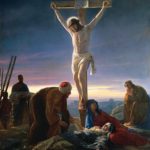When our children were young they would ask Cecelia or me to “promise” to do something or get something for them. We would say, “We will think about that but can’t promise we will do it.”
Sometimes our concern about the request was what such a promise would cost us. Another factor in our unwillingness to make a quick promise to their request was that life circumstances might make granting their wish impossible. We realized we were not God and not in control of what might happen to nullify the promise. So, one of our rules in raising our children was to be very careful about making promises we may not be able to keep.
But God, on the other hand, has made many promises to us, his children. The Bible is full of promises to those of us who have come into God’s family by putting our trust in Jesus.
The promise I’m writing about today is the most important, most far-reaching, most fantastic, and most inclusive promise made in human history. It is the promise related to Christmas, the holy day we Christians celebrate this time of year. I will attempt to explore the greatest promise in human history by looking at four questions:
- What is the Promise?
- When was the Promise made?
- Who is the Promise-Maker?
- Has the Promise been kept?
The Christmas season is upon us again. As a matter of fact, advertisers have been pushing their goods for weeks. Undoubtedly, Christmas is the most lucrative and sales-focused time of the year. During all the frenzy and fuss that surrounds the Christmas season, it is easy to miss its essential message, a message that grew out of a promise.
The reason this promise is the most important, most far-reaching, most fantastic, and most inclusive promise in human history is because of what it offers to me, you, and the entire human race. Let me try to explain.
What is the promise?
After God created the heavens and earth and prepared the beautiful Garden of Eden, He created Adam and Eve to rule over His creation and have communion with Him. But, tragedy comes when the man and woman disobey God and break the fellowship with their Creator. According to Paul’s writings in Romans 5:12-14, Adam is the progenitor of the human race, and by his sin, all human beings inherit his sinful nature and will die as a result of sin.
The Garden of Eden began with man and woman living in a perfect environment and fellowship with God. Their decision to listen to the lie of Satan changed everything for them and us. We are born sinners, who if left to our own, will self-destruct.
What then is the promise that points us to the true meaning of Christmas? It is the promise that God would provide the answer for our broken relationship with Him. He would bring about a way to forgive our sins and give us the eternal life that Adam and Eve forfeited in the Garden.
Think about God’s promise in light of these scriptures.
“For by the transgression of the one the many died, much more did the grace of God and the gift by the grace of one Man, Jesus Christ, abound to the many.” Romans 5:15
“For God loved the world so much that He gave his only begotten Son that whoever believes in Him will not perish but have eternal life.” John 3:16 (My translation).
When was the promise made?
The promise to offer salvation began in the place where the first sin was committed, the Garden of Eden. God made a promise to Eve and the devil in Genesis 3:14-16.
In verse 15 God speaks of a Person (Jesus) as the fulfillment of the promise and the battle this savior would wage against the Evil One, ” He shall bruise you (the evil one) on the head, and you shall bruise him on the heel.” This is the beginning of the promise to restore mankind to a right relationship with God.
We see indications of God’s developing plan throughout the Old Testament as he calls Abram (Genesis 12) to become the father of the nation of Israel through which this messiah (savior) would eventually come. In the 8th century B.C., the prophet Isaiah gave some explicit details concerning the savior God had promised back in the Garden of Eden. Isaiah 9 has a lengthy passage concerning the promised one. Here is a sample of that text, ” For a child will be born to us, a son will be given to us: And the government will rest on his shoulders: And His name will be called Wonderful Counselor, mighty God, Eternal Father, Prince of Peace.” Isaiah 9:6.
The entire fifty-third chapter of Isaiah gives graphic detail of how this promised messiah would suffer to deal with the problem of rebellion which began back in the Garden of Eden. Here’s just one prophetic verse to foreshadow what is going to happen to the messiah when he comes to earth to help us.
“He was wounded for our transgressions, He was crushed for our iniquities; the chastening for our well-being fell upon Him, and by His scourging we are healed.” Isaiah 53:5.
The promise God made in the Garden was, that while sin would have serious consequences, He would ultimately restore the Garden for mankind and provide the solution for the broken fellowship sin had caused.
Who is the promise maker?
Sadly, we live in a world where many political leaders, news organizations, and talk show hosts make promises and develop narratives to further their destructive agendas. They are like the fickle and immature parent who promises his child whatever they want just to get their end goal accomplished.
Some who make promises do not have the intention or power to fulfill the hope their words have stirred in the hearts of their believers. The result is empty promises and loss of hope and trust. The character of the promise-maker determines the truth or lie behind the words.
It’s a sad state of affairs when people have grown so skeptical of institutions and services that we used to depend on to tell us the truth. How does this skepticism affect the way we deal with God and His promises?
Can the Eternal God, Creator, and Lord be trusted to keep his promise to send a savior, a messiah into the world to redeem us from the curse of sin that began in the Garden of Eden?
Can we be forgiven and restored from being the enemy of God and become the children of God?
Is there hope for us, or are we doomed to an earthly existence without the presence of God and an endless eternity separated from him?
The biblical answer is clear, God can be trusted. He has kept every promise he has ever made to us. The biblical references to this fact are numerous. Search the scriptures. Begin in Genesis with characters like Enoch, Noah, Abram, Isaac, Jacob, and Joseph. Keep reading about Moses, Joshua, Caleb, the judges, King David, and the prophets. God made promises to all these people. What do you think they would say if you asked the question: “Can I trust God to keep his word, his promises?”
Has the Promise Been Kept?
The promise of a redeemer made long ago was fulfilled in the birth of a baby born to a teenage Jewish girl named Mary in a stable in Bethlehem over two millennia ago. He was named Jesus, according to the instructions of the angel who visited Mary to tell her of God’s plan for her. 
His birth was the beginning of the final step the Promise Maker would take to complete the redemption plan he spoke about to Eve in the Garden of Eden. The Eternal God became flesh and lived among us and went to the cross, giving his life to pay for the sin each of us has committed.

 Promise made. Promise kept in the birth, death, and resurrection of Jesus. Hallelujah, what a savior! What a promise! What a wonderful God we celebrate at Christmas.
Promise made. Promise kept in the birth, death, and resurrection of Jesus. Hallelujah, what a savior! What a promise! What a wonderful God we celebrate at Christmas.
Here’s another promise God makes to you. If you put your trust in Him, He will forgive your sin of unbelief and give you eternal life. “For God so loved the world that He gave His only son that whoever would believe in Him would not perish but have eternal life.” John 3:16
This is God’s Christmas gift to you. Have you received Jesus into your life? If not, will you right now?
How will you celebrate this Christmas this year? Here’s something I suggest you add to your list of something to do for Christmas: Why the Nativity? by David Jeremiah’s Turning Point ministry. It is a beautiful and worshipful experience and I want to encourage you to take the time to watch it. This is a marvelous account of how God fulfilled the promise to save you and me from the power and penalty of our sins. https://www.davidjeremiah.org/whythenativity?gclid=CjwKCAiAp7GcBhA0EiwA9U0mtirMDfYJ11ipRPVJ3iJwVtVWblx6UgkU6IfAIfcD0R9YngNPxsOvwxoC


6 thoughts on “The Promise”
I watched the “Why the Nativity” (David Jeremiah) I loved it so much; I will probably watch it again. I loved your “Promise” piece also. Your language is very easy to undertand when you write ; clear and very true to the Bible for anyone to understand.
Thanks Joan, Glad you enjoyed nativity production. Yes, it is excellent. Thanks for lunch and for your encouraging comments about my writing, for the most part I enjoy the process.
Cos absolutely wonderful message bless you. You have a wonderful Christmas and we’ll see you January 5. I love you.
Steve, thanks for reading my blogs. Your words encourage me to keep at it. Happy New Year to you and Dot.
Cos, a good very perceptive article/message about the real and true meaning of Christmas. Sadly commercialism and worldly concerns have clouded the message. But I trust God explicitly about His promises. His word will accomplish His outcomes. Merry Christmas to you both. God bless.
Ben, I hope you are well and have a good measure of health and able to enjoy and appreciate how good God is to us. At our “advanced” age, each day is truly a gift. And, whatever the future brings, God is in charge and our future is heaven. I enjoy the writing as it brings me deeper and deeper into scripture and into a better understanding of and appreciation for the the heart of our Savior. A God-Blessed New Year to you and yours, Cos